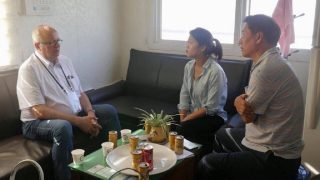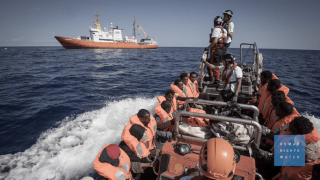Watching 93 emaciated refugees and migrants disembark from a Spanish NGO ship in the Italian port of Pozzallo earlier this month, the town’s mayor said they reminded him of “a scene from the concentration camps.”
They had boarded a boat bound for Europe, only to find themselves stranded at sea. One of them, a 21-year-old man called Segen, died a day later. However, his fellow travellers are receiving much-needed assistance, thanks to the brave actions of their rescuers aboard an NGO ship, the Proactiva Open Arms. The following week, that ship was itself making headlines.
The Open Arms was seized by Italian authorities on March 18. Their alleged crime? Rescuing another 218 refugees and migrants at sea on March 15 and refusing to hand them over to the Libyan Coast Guard, instead bringing them to port in Italy.
The outcry around the seizure of the boat and the investigation of three Proactiva members for “criminal conspiracy to facilitate illegal immigration,” has drawn necessary attention to the EU’s plan to outsource control of the central Mediterranean to the Libyan Coast Guard in order to prevent refugees and migrants from reaching Europe.
The Libyan Coast Guard disembarks the people it intercepts at sea on Libyan soil, where they face prolonged arbitrary detention in centers where torture is rife.
A European vessel is not able to lawfully return people to Libya because the transfer of a person to a place where they would be exposed to a real risk of torture or other serious human rights violations is prohibited. For this reason, European governments have invested in building up the capacity of the Libyan Coast Guard, which has in turn distorted in various ways the dynamics of rescue operations. When both Libyan Coast Guard vessels – mostly donated by Italy – and those of NGOs reach a boat in distress, following alerts sent by the Italian Coast Guard, there is frequent conflict.
On March 15, Open Arms reports having been threatened by the Libyan Coast Guard and told to hand over the people they had just rescued. Similar cases were documented in 2017, where Libyans shot in the air, pointed firearms at rescuers, issued threats via radio and even boarded NGO ships.
I have spoken to numerous refugees and migrants who told me how Libyan Coast Guard officials had threatened them and robbed them of their few belongings, or colluded with smugglers to make money. The U.N. has documented similar actions.
If the European assistance and training has enhanced the capacity of the Libyan Coast Guard, it has not increased their professionalism. Training is proving insufficient in the absence of solid monitoring and accountability mechanisms. Promises have been made in the past – involving cameras, mission reports and more – but concrete steps have been far too limited.
Despite this, European governments keep working to ensure the Libyan Coast Guard has the capacity not only to patrol the central Mediterranean, but also to coordinate rescue operations conducted by others.
The Italian Coast Guard has stated that the Libyan Coast Guard was coordinating the March 15 rescues. The rescues were carried out at about 73 nautical miles from Libya, in international waters. The area does not fall under the “Search and Rescue (SAR) region” (i.e., the area for which a country is responsible for coordinating rescue operations) of either Italy or Malta. According to Libyan authorities, it would instead fall on the putative SAR region of Libya.
Two problems emerge here. First, a Libyan SAR region does not currently exist, according to the International Maritime Organization. It is not even clear whether a Libyan Maritime Rescue Coordination Center is in place, as required. Some have suggested that it would be aboard the Italian Navy ship, Tremiti, docked in Tripoli.
Second, the state coordinating the rescue operation in its SAR region has the responsibility to indicate to the rescue vessel the “place of safety” where people can be disembarked, usually on its territory. However, since refugees and migrants cannot be lawfully returned to Libya, a vessel rescuing people at sea cannot be expected to hand people over to the Libyan Coast Guard to be returned to Libya. Indeed, no European navy or merchant ship has done so in recent years. If they did, they could end up in court and lose, as Italy did in 2012 in a landmark case before the European Court of Human Rights.
Therefore this incident sends a worrying signal – that Italy is now operating as if a Libyan SAR region existed, and expects NGOs to comply with the instructions of the Libyan Coast Guard.
Despite having initiated the rescue operation by alerting all vessels in the area and requesting Open Arms to approach the refugee boat, the Italian authorities considered that it was up to their Libyan counterparts – who were coordinating the rescue – to decide on a place for disembarkation. As a result, when Open Arms refused to hand over those rescued, there was uncertainty over where they should go – Malta or Italy.
The question remains: Since people rescued at sea cannot be lawfully disembarked in Libya, where do European governments expect NGOs to take them?
One thing is clear: If handing refugees and migrants to Libyan authorities breaches a principle of international law, then refusing to do so can hardly be considered a crime. The Catania prosecutor leading the case, Carmelo Zuccaro, is the same one who gained notoriety last year by engaging in public claims about supposed links between NGOs and traffickers, a claim he later admitted to be a theory without supporting evidence. The seizure may be nothing more than a new chapter in the unsubstantiated criminalization of NGOs.
The Open Arms may remain under police custody for months, just as the Iuventa, a ship run by the German NGO Jugend Rettet, has. The Iuventa is impounded on the grounds that it was “aiding illegal immigration” without sound evidence being produced or charges being pressed against the crew.
Crossings are likely to increase during spring. It is questionable whether the assets available to patrol the sea and assist people in distress are going to be sufficient.
While European governments must establish a solid mechanism to monitor operations by the Libyan Coast Guard, people rescued at sea should never be returned to Libya until the protection of their rights can be guaranteed.
To this end, European governments must condition their support to Libyan authorities on ensuring an end to arbitrary detention and an agreement that enables the U.N. Refugee Agency to assist all refugees. They must also provide sufficient resettlement places for refugees stranded in Libya as well as safe and legal routes for migrants.
It is time for our leaders to urgently reset their cooperation with Libya and to readjust their priorities to ensure that young men like Segen do not get beaten and abused in Libyan cells or die of exhaustion on Europe’s soil.
Amnesty International. Afghanistan:How Italy’s seizure of an NGO ship exposes Europe’s dangerous policy © Amnesty International 2018.



